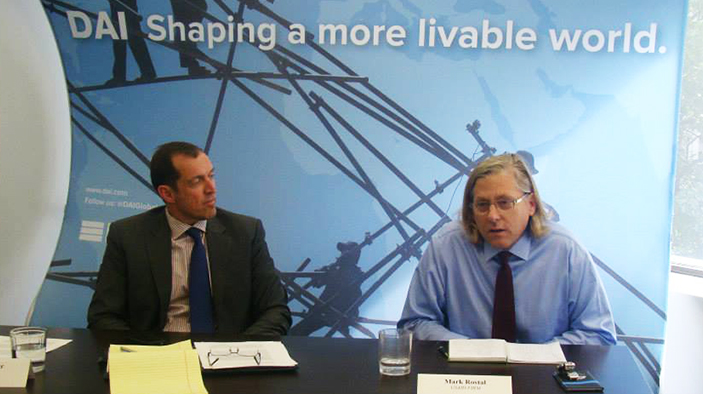DAI Helps Lead African Trade Discussion at SID-Washington Event
August 01, 2014
With multibillion-dollar transportation projects under way, including for a railway connecting Mombasa to Nairobi and eventually Uganda, Rwanda, Burundi, and Southern Sudan, Kenya’s rapid development is setting the pace for many other African countries. Its recent discoveries of oil, natural gas, and fresh water—which could greatly expand Kenya’s arable land for agriculture—present significant opportunities.
“Kenya and the African continent are industrializing rapidly, but only so many of its citizens can benefit from the fruits of this growth—with populations growing so rapidly, this becomes even more of a concern,” said DAI’s Mark Rostal, Chief of Party of the U.S. Agency for International Development (USAID) Financial Inclusion for Rural Microenterprises project in Kenya.

“Many economists recommend that Africa should focus on ensuring the proper structural economic transformation occurs,” Rostal (pictured at right) added. “While still focusing on [micro, small, and medium-sized enterprises], our partnership with Africa and Africans must include helping to build markets, industries, large companies, and so on.”
Rostal, who has led USAID finance projects in Kenya since 2004, provided his insights at “Investing in Africa: New Opportunities for Growth & Prosperity,” an Africa Development Forum event before a standing-room audience at Society for International Development in Washington, D.C.
Also contributing were fellow panelists Katrin Kuhlmann, president and founder of New Markets Lab and Special Advisor to the Corporate Council on Africa; and Ambassador (Dr.) Robin Renee Sanders, CEO of the FEEEDS Advocacy Initiative. Assistant U.S. Trade Representative for Africa Florie Liser gave the keynote address, and Jim Winkler, (pictured at left) vice president of DAI’s Solutions group, introduced the discussion and moderated.
The trade-focused event served to preview the U.S.-Africa Leaders Summit August 4–6 in Washington, D.C., which will advance the Administration’s focus on trade and investment in Africa and highlight America’s commitment to Africa’s security, democratic development, and people. Liser, for example, noted that numerous sectors in Africa could be targeted for further trade liberalization and improved facilitation, including vehicles and parts, foods, cocoa, cut flowers, and others.
To shape the discussion, Winkler noted that Africa’s middle class is significant—the size of India’s—and steadily growing, and the continent’s gross domestic product per capita has increased 70 percent since the 2000 passing of the African Growth and Opportunity Act, which expires in 2015. Other macroeconomic indicators such as debt are likewise trending favorably. But the average age on the continent is 18.6 years—half that of the rising BRIC nations of Brazil, Russia, India, and China—and Africa’s countries are experiencing rapid urbanization.
Panelists during the Q&A session cited major issues confronting African development. Sanders urged a clarifying and updating of maritime law treaties due to the large wealth being discovered off Africa’s shores. Rostal suggested that lowering interest rates would drive local business generation, job creation, consumer consumption, and general economic growth. Also considered vital was how to incorporate Africa’s very poor and its substantial and inevitable informal economy—in urban areas projected to grow to 3 billion people by 2050.
In complement with the U.S.-Africa Leaders Summit, the Africa Lead II project implemented by DAI will include 20 Young African Leaders Initiative (YALI) Washington Fellows in leadership training when they return to Tanzania this fall. Africa Lead II is a continent-wide U.S. Government Feed the Future project that is building the capacity of Africa’s agriculture hierarchy to develop, manage, and lead programs.
RELATED CONTENT:
USAID Georgia Project Nominated for Inclusive Entrepreneurship Initiative of the Year
The USAID Economic Security Program in Georgia has been shortlisted for the Emerging Europe Awards 2022 in the category, “Inclusive Entrepreneurship Initiative of the Year.”
Read More